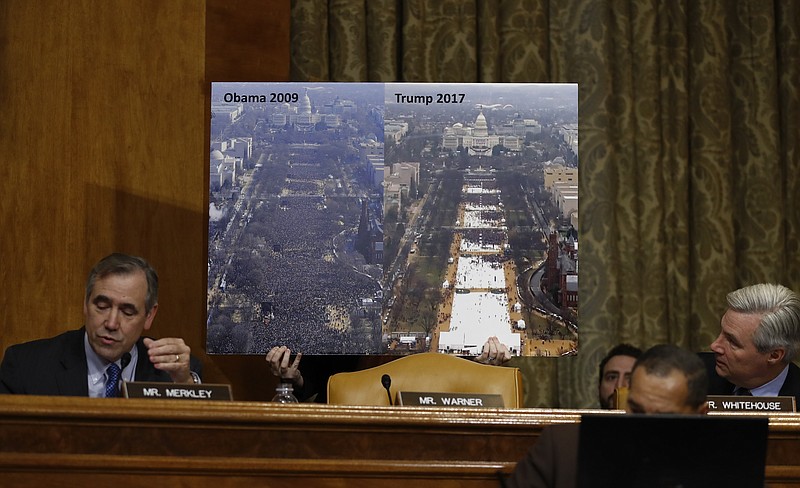WASHINGTON (AP) - Congressional Republicans are discovering that with Donald Trump in the White House, they may be spending a lot of time answering for false claims from their president.
Eager to dive into a packed legislative agenda in a new era of GOP governance, Republicans instead found themselves confronting questions Tuesday about Trump's claim that he would have won the popular vote but for 3 million to 5 million ballots cast by immigrants in the country illegally.
No evidence supports that assertion, which Trump made in a private meeting with Democratic and Republican congressional leaders at the White House on Monday night. Trump has also made incorrect claims about crowds at his inauguration and his feud with the CIA in the four days since taking office.
Some Republicans came to Trump's defense, blaming the media for stirring controversies, while others, including House Speaker Paul Ryan, sought to distance themselves from Trump's views and then quickly move on. But for many lawmakers, Trump's comments raised the frustrating prospect that even as they face daunting policy challenges starting with repealing and replacing former President Barack Obama's health care law, their new president could knock them constantly off track.
Trump should "get to the serious business of governing," said Rep. Charlie Dent, R-Pa. "The election is over."
The election may be over, but Trump and his administration have stuck with a strategy that he once described as "truthful hyperbole." In public appearances and private meetings, the president has repeated several falsehoods from his campaign and transition period. Campaign aide Kellyanne Conway described the inaccurate remarks as "alternative facts" in a Sunday interview with NBC's "Meet the Press."
Critics simply call them lies.
Trump's claim that immigrants voting illegally had robbed him of a popular vote majority was similar to a statement he made on Twitter in November that he had "won the popular vote if you deduct the millions of people who voted illegally." Hillary Clinton won the popular vote by nearly 2.9 million votes and there is no indication that significant numbers of voters cast illegal ballots for either candidate.
That claim followed an effort by Trump to blame strained relations with the intelligence community on "dishonest" journalists during a Saturday visit to CIA headquarters, despite repeated remarks during his transition period questioning the integrity of the country's intelligence services. He also wildly overstated the number of people who gathered on the National Mall as he took the oath of office.
Republican leaders are desperately trying to ignore the untrue remarks. Trump's remarks in the Monday meeting went unchallenged.
"I'm not going to re-litigate that. It's time to move on," said Texas Sen. John Cornyn on Tuesday.
That's a political game Republicans tried to play during the campaign - ignoring Trump's controversial statements to avoid tagging the entire Republican Party with the fallout and distracting from their broader political message. They had limited success: Trump's inflammatory remarks about Mexican immigrants, women and Muslims dominated the news coverage for weeks.
With Republicans now holding near-universal power in Washington, the stakes are even higher. Not only could Trump's penchant to mix truth and fiction hamper the GOP's ability to pass an ambitious agenda, it could also pull the entire party into the vortex of explaining and defending dissimulation from the commander in chief. Few may emerge untainted.
"The blame game is silly and weird," said Rep. Mark Sanford, R-S.C., who described Trump's first few days in office as a "mixed bag" and "a rocky start" based on the telephone calls he's getting from constituents.
"Whether it's distraction or detractors, what you cannot do is chase every story that you don't like," he said.
To Trump's many Capitol Hill supporters, though, the story is simpler: Trump is off to a great start, and the media are the ones telling lies.
"What it shows is we have a liberal press that is continuing to play into the Democrat playbook, which is in this case anything they can do to delegitimize the election of this presidency and try to put a damper on those of us who are ecstatic at his election," said Rep. Chris Collins, R-N.Y. "What we see is this president is not going to roll over with the press misreporting things."
___
Associated Press writers Mary Clare Jalonick and Richard Lardner contributed to this report.
